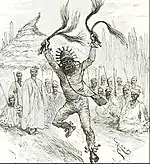| Part of a series on Vodun related religions called |
| Voodoo |
|---|
 |
Cuban Vodú is a religion indigenous to Cuba. It is a religion formed from the blending of Fon and Ewe beliefs and Dahomey religion which came to form Haitian Vodou. Loa are worshiped by the religion's practitioners.[1] Cuban Vodú is noteworthy for its popularity in the Oriente Province of Cuba and a lack of academic study of the religion.[2]
Even though much of the practices come from Haitian immigrants bringing Haitian Vodou to Cuba the Cuban practices subsequently evolved and came to differ in some ways. For instance: feats of strength are more common in ceremonies and dance movements differ.[3] Cuban Vodú is composed of three divisions: the Indigenous Division, whose spirits are of caribbean origin (usually refers to Taíno spirits); the African Division, whose spirits are of African origin (usually Fon and Ewe spirits); and the European Division, whose spirits are of European origin (usually Spanish spirits).[4]
See also
References
- ↑ Ashcraft-Eason, Lillian; Martin, Darnise; Olademo, Oyeronke (2010). Women and New and Africana Religions. ISBN 9780275991562.
- ↑ Dodson, Jualynne; Batista, Jose (2008). Sacred Spaces and Religious Traditions in Oriente Cuba. ISBN 9780826343536.
- ↑ Daniel, Yvonne (2005). Dancing Wisdom:Embodied Knowledge in Haitian Vodou, Cuban Yoruba, and Bahian Candomble. ISBN 9780252072079.
- ↑ "Vodu".
External links
- El Vodú francohaitiano en la cultura cubana
- Daniel, Yvonne. Dancing Wisdom: Embodied Knowledge in Haitian Vodou, Cuban Yoruba, and Bahian Candomblé.
- Women and New and Africana Religions. ABC-CLIO, 2010.